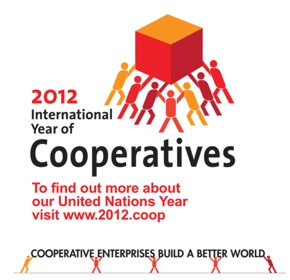Co-operation – 2012's not all about the Olympics
 As of yesterday, it’s International Year of Co-operatives, a UN initiative to promote co-operative models of business. Rhizome is a co-op, so it seemed a good idea to tell you a little about that – what does it actually mean, and why would we bother?
As of yesterday, it’s International Year of Co-operatives, a UN initiative to promote co-operative models of business. Rhizome is a co-op, so it seemed a good idea to tell you a little about that – what does it actually mean, and why would we bother?
I’ve been involved in 2 previous co-ops, both workers’ co-ops in which the employees of the company are also its directors. Employee ownership. Very simple. Rhizome however is different. We’re a co-operative consortium – a collective of freelance trainers, facilitators and mediators who come together to do some of their work under the Rhizome banner. We’re all self-employed. We choose how involved we want to be in Rhizome, and we can be flexible about that – doing more or less as fits with the rest of our lives.
So why the co-op? What’s in it for us? What’s in it for you?
For the 7 people involved in Rhizome mutual support, and the sharing of ideas, skills, and challenges ranks high. At a recent Rhizome gathering the energy just from all being in the same room, and from getting an opportunity to share ideas, thoughts and approaches on issues that we found challenging or interesting was tangible. One person even said (and I paraphrase) that “in 20 years of facilitating I’ve never had the chance to have these conversations”.
We also get asked to do very interesting work with interesting and exciting groups of people who are making real change in the world (and in themselves). That isn’t something all facilitators can say of their work.
And of course Rhizome is also a known entity with a reputation and an ever-growing list of groups and organisations that have chosen to work with us. That brings in some paid work, so there’s some income (very modest at present) to be had. But most Rhizome folk earn the bulk of their living elsewhere, coming to Rhizome for the challenge of the work we do, and the mutual support.
For you there are equal benefits. One of the most exciting things, for me, about Rhizome is that it makes a vast array of skills and experience available to communities and activist groups and organisations. Because of our co-operative consortium structure there’s less pressure to earn 100% of your income with Rhizome, to commit 100% of your working life to Rhizome. If that pressure existed, most of the 7 of us would have to decline and take our skills elsewhere to earn our living. But as things stand people can get involved in Rhizome on their terms and thus be available to you and the groups you work with.
Being a co-op also keeps us in tune with many of the skills we support others to develop – what it means to work in a group, what it means to be doing consensus, what it means to be communicating effectively, developing empathy and trust and much more. A hierarchical structure doesn’t foster those values in the same way and we’d be more likely to lose touch. And a solo freelance career doesn’t create the opportunities for peer reflection, and to learn from co-facilitation and observation that Rhizome gives. All that means we’re better at what we do when we work with you
We also get to support each other in innovating and taking risks – both in creating a space in which it’s OK to try out new ideas, but also creating a space in which you can be pushed further than you had planned to go in your risk-taking. And trust me when I say that that means better support for you.
There are other aspects of co-operative working. One of the 7 principles of co-operation is mutual aid between co-ops. As a co-op we’re more likely to look for another co-op for any external support we need – so we’ve used Calverts Co-op for our printing, and Cooportunity to do our end of year accounting. We’re also more likely to get asked to work with another co-op. As I type Carl is training mediators drawn from co-ops across the UK for Co-operatives UK.
Personally, I find that co-ops are the only place I can flourish. They’re not without their challenges. But I hope the benefits to you and to us far outweigh the problems.

Link Loving 16.01.12 « Casper ter Kuile
January 16, 2012 @ 9:16 pm
[…] 2012: the international year of co-operatives. Rhizome. […]